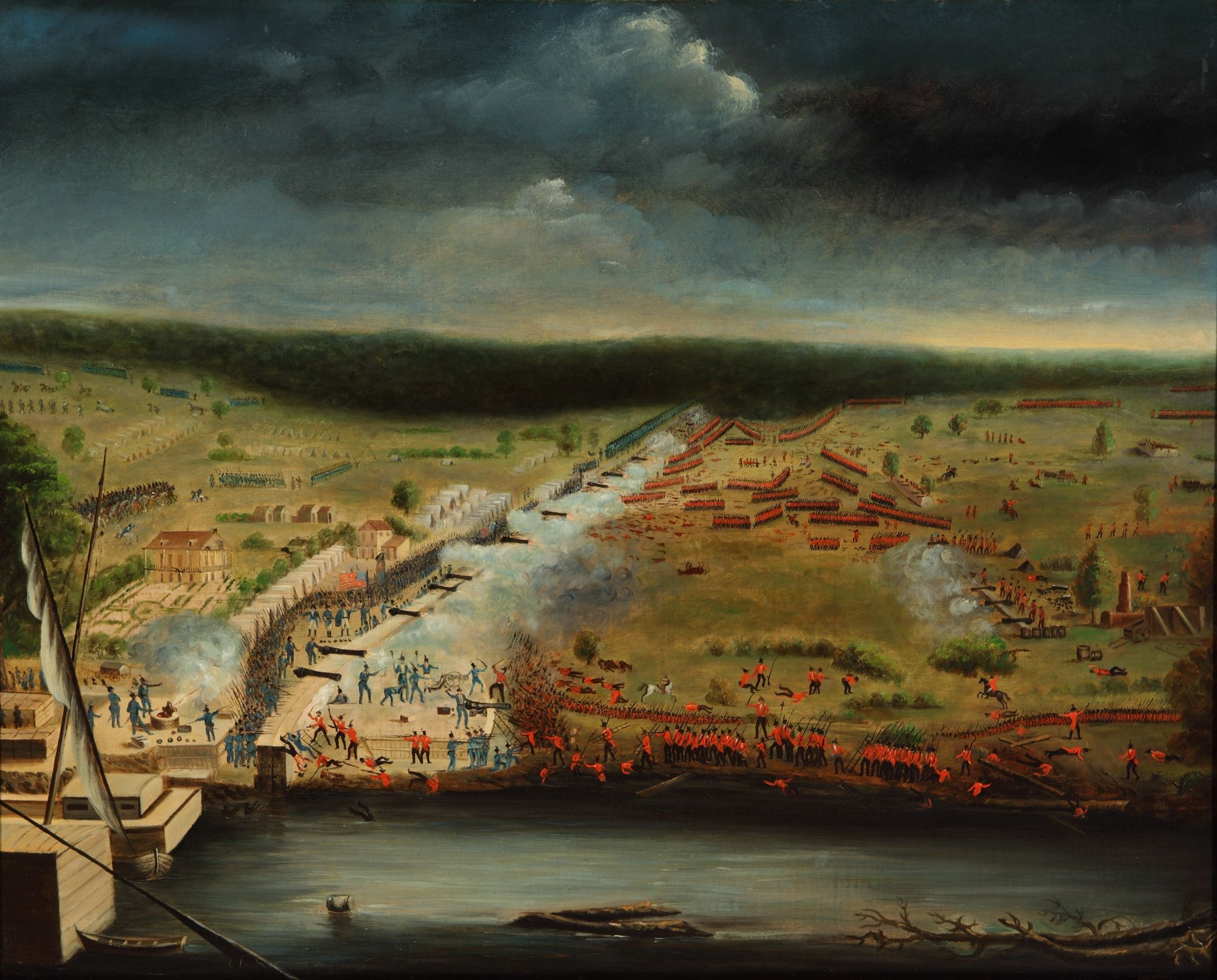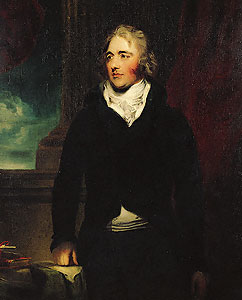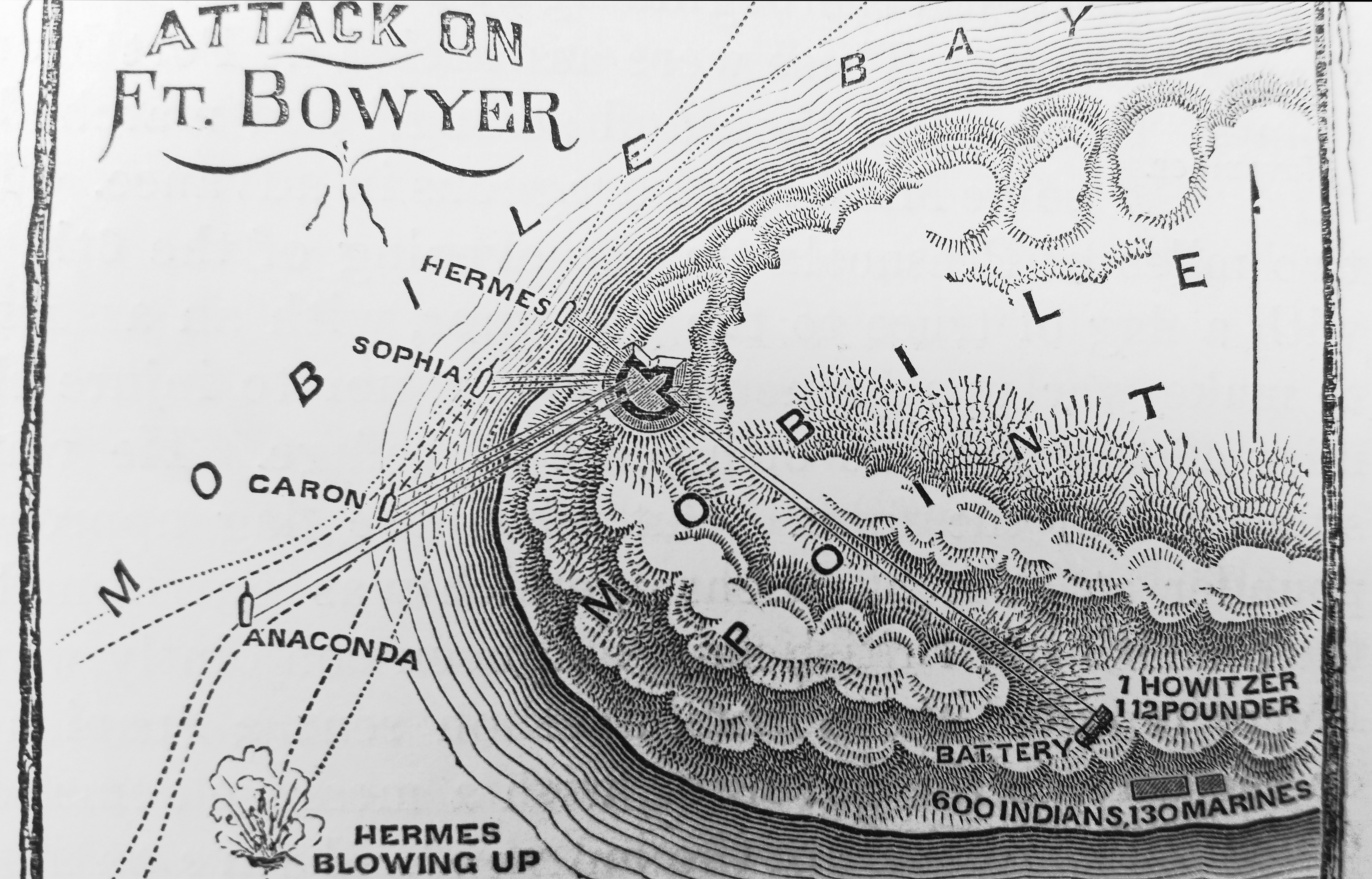|
Battle Of New Orleans
The Battle of New Orleans was fought on January 8, 1815 between the British Army under Major General Sir Edward Pakenham and the United States Army under Brevet Major General Andrew Jackson, roughly 5 miles (8 km) southeast of the French Quarter of New Orleans, in the current suburb of Chalmette, Louisiana. The battle was the climax of the five-month Gulf Campaign (September 1814 to February 1815) by Britain to try to take New Orleans, West Florida, and possibly Louisiana Territory which began at the First Battle of Fort Bowyer. Britain started the New Orleans campaign on December 14, 1814, at the Battle of Lake Borgne and numerous skirmishes and artillery duels happened in the weeks leading up to the final battle. The battle took place 15 days after the signing of the Treaty of Ghent, which formally ended the War of 1812, on December 24, 1814, though it would not be ratified by the United States (and therefore did not take effect) until February 16, 1815, as n ... [...More Info...] [...Related Items...] OR: [Wikipedia] [Google] [Baidu] |
Daniel Patterson (naval Officer)
Daniel Todd Patterson (March 6, 1786 – August 25, 1839) was an officer in the United States Navy during the Quasi-War with France, the First Barbary War, and the War of 1812. Early life Patterson was born on Long Island, New York. He was a son of John Patterson and Catherine ( Livingston) Patterson (1744–1832). His father was a younger brother of Walter Patterson, who was the first Royal Governor of Prince Edward Island (then named St. John's Island). John and Walter came to America in the 1750s from Ramelton or Rathmullan, County Donegal, Ireland, and served in the British Army in the French and Indian War. His paternal grandfather was Robert Livingston, 3rd Lord of the Livingston Manor. His maternal aunt, Mary Livingston, was the wife of James Duane, a respected lawyer, patriot, New York politician, and judge. Career As acting midshipman, he joined the sloop of war , June 11, 1799, to cruise against French privateers and warships in the West Indies to August 1800. Appo ... [...More Info...] [...Related Items...] OR: [Wikipedia] [Google] [Baidu] |
War Of 1812
The War of 1812 (18 June 1812 – 17 February 1815) was fought by the United States of America and its indigenous allies against the United Kingdom and its allies in British North America, with limited participation by Spain in Florida. It began when the United States declared war on 18 June 1812 and, although peace terms were agreed upon in the December 1814 Treaty of Ghent, did not officially end until the peace treaty was ratified by Congress on 17 February 1815. Tensions originated in long-standing differences over territorial expansion in North America and British support for Native American tribes who opposed US colonial settlement in the Northwest Territory. These escalated in 1807 after the Royal Navy began enforcing tighter restrictions on American trade with France and press-ganged men they claimed as British subjects, even those with American citizenship certificates. Opinion in the US was split on how to respond, and although majorities in both the House an ... [...More Info...] [...Related Items...] OR: [Wikipedia] [Google] [Baidu] |
French Quarter
The French Quarter, also known as the , is the oldest neighborhood in the city of New Orleans. After New Orleans (french: La Nouvelle-Orléans) was founded in 1718 by Jean-Baptiste Le Moyne de Bienville, the city developed around the ("Old Square" in English), a central square. The district is more commonly called the French Quarter today, or simply "The Quarter," related to changes in the city with American immigration after the 1803 Louisiana Purchase. Most of the extant historic buildings were constructed either in the late 18th century, during the city's period of Spanish rule, or were built during the first half of the 19th century, after U.S. purchase and statehood. The district as a whole has been designated as a National Historic Landmark, with numerous contributing buildings that are separately deemed significant. It is a prime tourist destination in the city, as well as attracting local residents. Because of its distance from areas where the levee was breached durin ... [...More Info...] [...Related Items...] OR: [Wikipedia] [Google] [Baidu] |
Napoleon Bonaparte
Napoleon Bonaparte ; it, Napoleone Bonaparte, ; co, Napulione Buonaparte. (born Napoleone Buonaparte; 15 August 1769 – 5 May 1821), later known by his regnal name Napoleon I, was a French military commander and political leader who rose to prominence during the French Revolution and led successful campaigns during the Revolutionary Wars. He was the ''de facto'' leader of the French Republic as First Consul from 1799 to 1804, then Emperor of the French from 1804 until 1814 and again in 1815. Napoleon's political and cultural legacy endures to this day, as a highly celebrated and controversial leader. He initiated many liberal reforms that have persisted in society, and is considered one of the greatest military commanders in history. His wars and campaigns are studied by militaries all over the world. Between three and six million civilians and soldiers perished in what became known as the Napoleonic Wars. Napoleon was born on the island of Corsica, not long a ... [...More Info...] [...Related Items...] OR: [Wikipedia] [Google] [Baidu] |
Louisiana Purchase
The Louisiana Purchase (french: Vente de la Louisiane, translation=Sale of Louisiana) was the acquisition of the territory of Louisiana by the United States from the French First Republic in 1803. In return for fifteen million dollars, or approximately eighteen dollars per square mile, the United States nominally acquired a total of in Middle America. However, France only controlled a small fraction of this area, most of which was inhabited by Native Americans; effectively, for the majority of the area, the United States bought the "preemptive" right to obtain "Indian" lands by treaty or by conquest, to the exclusion of other colonial powers. The Kingdom of France had controlled the Louisiana territory from 1699 until it was ceded to Spain in 1762. In 1800, Napoleon, the First Consul of the French Republic, regained ownership of Louisiana as part of a broader effort to re-establish a French colonial empire in North America. However, France's failure to suppress a revol ... [...More Info...] [...Related Items...] OR: [Wikipedia] [Google] [Baidu] |
Admiralty (United Kingdom)
The Admiralty was a department of the Government of the United Kingdom responsible for the command of the Royal Navy until 1964, historically under its titular head, the Lord High Admiral – one of the Great Officers of State. For much of its history, from the early 18th century until its abolition, the role of the Lord High Admiral was almost invariably put "in commission" and exercised by the Lords Commissioner of the Admiralty, who sat on the governing Board of Admiralty, rather than by a single person. The Admiralty was replaced by the Admiralty Board in 1964, as part of the reforms that created the Ministry of Defence and its Navy Department (later Navy Command). Before the Acts of Union 1707, the Office of the Admiralty and Marine Affairs administered the Royal Navy of the Kingdom of England, which merged with the Royal Scots Navy and the absorbed the responsibilities of the Lord High Admiral of the Kingdom of Scotland with the unification of the Kingdom of Gr ... [...More Info...] [...Related Items...] OR: [Wikipedia] [Google] [Baidu] |
Henry Bathurst, 3rd Earl Bathurst
Henry Bathurst, 3rd Earl Bathurst, (22 May 176227 July 1834) was a High Tory, High Church Pittite. He was an MP for thirty years before ennoblement. A personal friend of William Pitt the Younger, he became a broker of deals across cabinet factions during the Napoleonic era. After the Napoleonic Wars, Bathurst was on the conservative wing of the Tory party. Background and education Lord Bathurst was the elder son of Henry Bathurst, 2nd Earl Bathurst, by his wife Tryphena Scawen, daughter of Thomas Scawen. He was educated at Eton College from 1773 to 1778 and then up to Christ Church, Oxford. This college was considered the most academic at Oxford, and he went up with his closest companions at Eton William Wyndham Greville, Richard, Lord Wellesley and Canon Bathurst, his cousin. He matriculated at Christ Church on 22 April 1779, at the age of sixteen. In 1781, he decided to embark on a Grand Tour of Europe. Without taking a degree, Bathurst left Oxford for Germany, where he ... [...More Info...] [...Related Items...] OR: [Wikipedia] [Google] [Baidu] |
Secretary Of State For War And The Colonies
The Secretary of State for War and the Colonies was a British cabinet-level position responsible for the army and the British colonies (other than India). The Secretary was supported by an Under-Secretary of State for War and the Colonies. History The Department was created in 1801. In 1854 it was split into the separate offices of Secretary of State for War and Secretary of State for the Colonies The secretary of state for the colonies or colonial secretary was the British Cabinet minister in charge of managing the United Kingdom's various colonial dependencies. History The position was first created in 1768 to deal with the increasi .... List of Secretaries of State for War and the Colonies (1801–1854) ;Notes: UK History of the Foreign and Commonwealth Office {{DEFAULTSORT:Secretary Of State For War And The Colonies War and the Colonies 1801 establishments in the United Kingdom 1854 disestablishments in the United Kingdom Defunct ministerial offices ... [...More Info...] [...Related Items...] OR: [Wikipedia] [Google] [Baidu] |
Second-in-command
Second-in-command (2i/c or 2IC) is a title denoting that the holder of the title is the second-highest authority within a certain organisation. Usage In the British Army or Royal Marines, the second-in-command is the deputy commander of a unit, from battalion or regiment downwards. This terminology is also used in many other Commonwealth armies and other nations. The equivalent appointment in the United States Army is the executive officer. The second-in-command of a battalion or regiment is usually a major. The second-in-command of a company, squadron, or artillery battery (in which they are called the battery captain) is usually a captain (although infantry company second-in-commands were usually lieutenants until after the Second World War), the second-in-command of a platoon or troop is the platoon or troop sergeant, and the second-in-command of a section is usually a lance corporal. In the Royal Navy and Commonwealth navies, the second-in-command of a vessel, reg ... [...More Info...] [...Related Items...] OR: [Wikipedia] [Google] [Baidu] |
Treaty Of Ghent
The Treaty of Ghent () was the peace treaty that ended the War of 1812 between the United States and the United Kingdom. It took effect in February 1815. Both sides signed it on December 24, 1814, in the city of Ghent, United Netherlands (now in Belgium). The treaty restored relations between the two parties to ''status quo ante bellum'' by restoring the pre-war borders of June 1812. The treaty was approved by the British Parliament and signed into law by the Prince Regent (the future King George IV) on December 30, 1814. It took a month for news of the treaty to reach the United States, during which American forces under Andrew Jackson won the Battle of New Orleans on January 8, 1815. The treaty did not take effect until the U.S. Senate ratified it unanimously on February 16, 1815. U.S. President James Madison signed the treaty and exchanged final ratified copies with the British ambassador on February 17, 1815. The treaty began more than two centuries of mostly-peaceful relati ... [...More Info...] [...Related Items...] OR: [Wikipedia] [Google] [Baidu] |
Battle Of Lake Borgne
The Battle of Lake Borgne was a coastal engagement between the Royal Navy and the U.S. Navy in the American South theatre of the War of 1812. It occurred on December 14, 1814 on Lake Borgne. The British victory allowed them to disembark their troops unhindered nine days later and to launch an offensive upon New Orleans on land. Background In August 1814, Vice Admiral Cochrane had convinced the Admiralty that a campaign against New Orleans would weaken American resolve against Canada, and hasten a successful end to the war. In the winter of 1814, the British had the objective of gaining control of the entrance of the Mississippi, and to challenge the legality of the Louisiana Purchase. To this end, an expeditionary force of about 8,000 troops under General Edward Pakenham had arrived in the Gulf Coast, to attack New Orleans. An anonymous letter sent from Pensacola, dated December 5 and addressed to Commodore Daniel Patterson warned him of this imminent threat, and was received o ... [...More Info...] [...Related Items...] OR: [Wikipedia] [Google] [Baidu] |
Fort Bowyer
Fort Bowyer was a short-lived earthen and stockade fortification that the United States Army erected in 1813 on Mobile Point, near the mouth of Mobile Bay in what is now Baldwin County, Alabama, but then was part of the Mississippi Territory. The British twice attacked the fort during the War of 1812. The first attack took place in September 1814; unsuccessful, it led to the British changing their strategy and attacking New Orleans. The second attack, following the Battle of New Orleans, was successful. It took place in February 1815, after the Treaty of Ghent had been signed but before the news had reached that part of America. Between 1819 and 1834 the United States built a new masonry fortification, Fort Morgan, on the site of Fort Bowyer. Construction Mobile had been a Spanish possession before the beginning of the Patriot War, but Congress had declared it American territory after the War of 1812 started. After Spanish forces evacuated Mobile in April 1813, the American ... [...More Info...] [...Related Items...] OR: [Wikipedia] [Google] [Baidu] |








